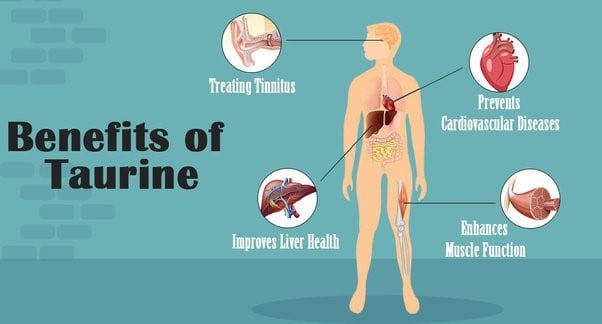Taurine, a naturally occurring sulfur-containing amino acid, plays a crucial role in various bodily functions, despite not being involved in protein synthesis. Concentrated primarily in the brain, eyes, heart, and muscles, taurine is classified as a conditionally essential amino acid, meaning its importance escalates during periods of illness or stress. Contrary to past misconceptions, taurine is not derived from bull semen or urine; its name originates from “Bos taurus,” the Latin term for ox, from whose bile it was first isolated in 1827. While healthy adults typically synthesize sufficient taurine, newborns and infants rely on dietary sources like breast milk or supplemented formula, as their endogenous production is limited.
Several studies highlight taurine’s potential in diabetes management. Its antioxidant and anti-inflammatory properties may enhance insulin sensitivity, mitigating the risk of type 2 diabetes. Research indicates that individuals with diabetes exhibit significantly lower taurine concentrations compared to their non-diabetic counterparts, suggesting a potential therapeutic role for taurine. Further studies demonstrate that taurine supplementation can support healthy blood sugar levels and offer protection against diabetes-related complications such as nerve damage, kidney damage, and heart disease. This suggests that taurine could be a valuable adjunct therapy in comprehensive diabetes care.
Taurine also demonstrates significant promise in supporting cardiovascular health. Studies show that taurine supplements can effectively regulate blood pressure, improve heart function, and modulate blood fat levels in individuals with heart conditions, especially heart failure. High doses of taurine have also been linked to reduced cholesterol levels, lower blood pressure, and a decreased risk of heart disease-related mortality. Clinical trials using taurine supplementation have shown positive results in reducing total cholesterol, triglycerides, and C-reactive protein (CRP), a marker of inflammation, in heart failure patients. These findings underscore taurine’s potential as a cardioprotective agent.
Beyond diabetes and heart health, taurine exhibits a range of other potential benefits. It may enhance exercise performance by improving muscle contraction, delaying fatigue, and potentially increasing fat burning during physical activity. Studies suggest that taurine supplementation can increase oxygen uptake, extend time to exhaustion, reduce muscle damage, improve recovery times, and enhance strength and power. While the observed effects on exercise performance are generally small and inconsistent, they warrant further investigation. A dosage of 1-3 grams of taurine, taken 1-3 hours before exercise for a duration of 6-21 days, is generally recommended to explore potential benefits.
Emerging research also suggests that taurine contributes to eye health, hearing, and neurological function. Its antioxidant properties may combat oxidative stress implicated in retinal degenerative diseases like age-related macular degeneration. Taurine may also protect the delicate hair cells within the ear, a key factor in preventing hearing loss. Furthermore, the anti-inflammatory effects of taurine hold promise in reducing brain inflammation and potentially mitigating neurodegenerative conditions such as Alzheimer’s disease. Preliminary studies also indicate that taurine may offer protective effects against liver damage, although more research is needed in this area.
Taurine generally exhibits a strong safety profile. Studies using moderate doses have reported no adverse effects. While some individuals have experienced side effects such as vomiting, nausea, liver pain, headache, and stomach pain, it remains unclear whether these are directly attributable to taurine or other concomitantly ingested substances. While there is no evidence of negative interactions between taurine and prescription medications, it’s important to note that taurine acts as a cytochrome P450 enzyme inhibitor. This means it could potentially interfere with the metabolism of certain drugs, including antidepressants, antiepileptic drugs, warfarin, and statins. Therefore, individuals taking these medications should consult their doctor before using taurine supplements.
Typical taurine dosages range from 500-3,000 mg per day, with some authorities suggesting that up to 6,000 mg daily is safe. A dose of 3,000 mg per day is often recommended to maximize benefits while remaining within a safe range. Taurine is readily available in powder or capsule form, offering a cost-effective way to obtain its potential benefits. Most capsule supplements contain 500-1,000 mg per serving, while powdered taurine can provide 1,000-2,000 mg per serving.
Taurine is naturally abundant in animal proteins like meat, seafood, and dairy, but it is absent in plant-based foods. Consequently, individuals following vegan or vegetarian diets may have lower taurine levels. However, the taurine used in supplements and energy drinks is typically synthetic, making it suitable for those avoiding animal products. Energy drinks often contain around 750 mg of taurine per 8-ounce serving.
In summary, taurine is a versatile amino acid with wide-ranging physiological functions, including maintaining hydration and electrolyte balance, forming bile salts for digestion, regulating minerals, supporting the central nervous system and eye function, and modulating immune system health and antioxidant activity. While healthy adults can produce enough taurine for basic functions, certain populations, including those with heart or kidney failure and premature infants receiving intravenous feeding, may require supplemental taurine. Animal studies demonstrate that taurine deficiency can lead to serious health issues, highlighting its essential role in overall health and well-being.














